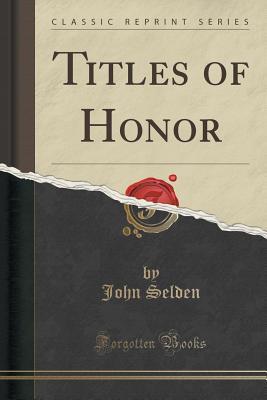- Bible
- Read the Bible
- Bible Versions
- Verse of the Day
- Reading Plans
- Verses by Topic
- Books of the Bible
- Bible Images
- Study
- Commentaries
- Concordances
- Dictionaries
- Encyclopedias
- Sermons
- Bible Atlas & Maps
- BP Wiki
- Devotionals
- Today's Devotionals
- Light of the World
- All Devotionals
- Inspirational Quotes
- More
- Picture Quotes
- Videos
- Inspirational
- Bible Study
- What The Bible Says
- Bible Q&As
- Daily Bread
- Bible by Genre
- Bible Stories
- Random Bible Verse
- Community
- Store
Titles of Honor (Classic Reprint)
by John Selden
Excerpt from Titles of Honor
Civil confiderations than that Quadripartite divifion of it in the School of Plato. Maj) ieuye'vsla he ei'hi tifflaea' 21 uh ialv am 51 oro'gpvot 11am; no'meai 15} Show: in when 341111145195 03mm; midrib Show bei; claw 51 4575939101 hlbvaqwm'fls 11} blpyet'ifis yefevnye'ruof 78's in Thimv bllycvei's (09i 29. Amo ii, id? 30111516769, n o'vomczoi a? Sore. Gpa'bm'ae, 330ml qwgtlr'mv 5.)d 15 78 yeyevntce'vsts al-yetti's tag; mfopejo/aev. Am shite, Eoiv wife's we 27 variance flatlxlnxltdg; unable; X09; 715701 aiyevii with 15} 717; yr bllyevdag aw'ful arm 7175 $6594 ieu'yevei are 75 stir, Sari nagjgp'vwv'fincluftflei'i Jlauotqzii, vol 4? O'sfhifmv.
About the Publisher
Forgotten Books publishes hundreds of thousands of rare and classic books. Find more at www.forgottenbooks.comwww.forgottenbooks.com
This book is a reproduction of an important historical work. Forgotten Books uses state-of-the-art technology to digitally reconstruct the work, preserving the original format whilst repairing imperfections present in the aged copy. In rare cases, an imperfection in the original, such as a blemish or missing page, may be replicated in our edition. We do, however, repair the vast majority of imperfections successfully; any imperfections that remain are intentionally left to preserve the state of such historical works.
Civil confiderations than that Quadripartite divifion of it in the School of Plato. Maj) ieuye'vsla he ei'hi tifflaea' 21 uh ialv am 51 oro'gpvot 11am; no'meai 15} Show: in when 341111145195 03mm; midrib Show bei; claw 51 4575939101 hlbvaqwm'fls 11} blpyet'ifis yefevnye'ruof 78's in Thimv bllycvei's (09i 29. Amo ii, id? 30111516769, n o'vomczoi a? Sore. Gpa'bm'ae, 330ml qwgtlr'mv 5.)d 15 78 yeyevntce'vsts al-yetti's tag; mfopejo/aev. Am shite, Eoiv wife's we 27 variance flatlxlnxltdg; unable; X09; 715701 aiyevii with 15} 717; yr bllyevdag aw'ful arm 7175 $6594 ieu'yevei are 75 stir, Sari nagjgp'vwv'fincluftflei'i Jlauotqzii, vol 4? O'sfhifmv.
About the Publisher
Forgotten Books publishes hundreds of thousands of rare and classic books. Find more at www.forgottenbooks.comwww.forgottenbooks.com
This book is a reproduction of an important historical work. Forgotten Books uses state-of-the-art technology to digitally reconstruct the work, preserving the original format whilst repairing imperfections present in the aged copy. In rare cases, an imperfection in the original, such as a blemish or missing page, may be replicated in our edition. We do, however, repair the vast majority of imperfections successfully; any imperfections that remain are intentionally left to preserve the state of such historical works.
BUY NOW
Paperback, 824 pages
Published December 20th 2018 by Forgotten Books (first published August 2006)
© 2025 Bibleportal.com All rights reserved.

John Selden was an English jurist, scholar of England's ancient laws and constitution and scholar of Jewish law. He was known as a polymath showing true intellectual depth and breadth; John Milton hailed Selden in 1644 as "the chief of learned men reputed in this land."
He joined in the protestation of the Commons for the maintenance of the Protestant religion according to the doctrines of the Church of England, the authority of the crown, and the liberty of the subject.
Selden arrived at an Erastian position in church politics. He also believed in free will, which was inconsistent with Calvinism.
... Show more